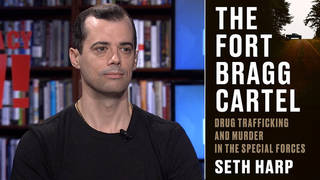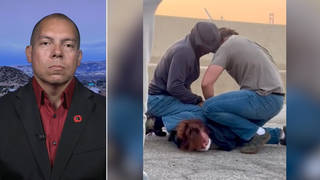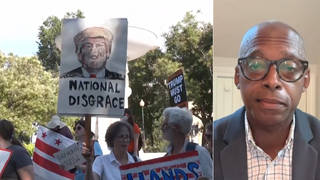
Groundbreaking comedian, Richard Pryor, died in Los Angeles Saturday at the age of 65 of a heart attack. Pryor’s body of work set the standard for American comedy while penetrating and revealing the African-American experience to a wide audience. We speak with journalist and author Mel Watkins. [includes rush transcript]
On Saturday, the groundbreaking comedian, Richard Pryor died in Los Angeles at the age of 65. The cause was a heart attack. Pryor’s health had been in decline for many years and he had a long publicized history with drug abuse. He was diagnosed with multiple sclerosis in 1986.
Richard Pryor’s body of work set the standard for American comedy while penetrating and revealing the African-American experience to a wide audience. An obituary in Newsday states that his body of work was a “political movement in itself and was steeped in race class and social commentary.” Comedian Steve Martin, upon hearing of Pryor’s death said to the Associated Press quote “By expressing his heart, anger and joy, Richard Pryor took comedy to its highest form.”
Pryor was born in 1940 in Peoria, Illinois and had a stint in the army after getting kicked out of school in the eighth grade. He then toured the club circuit before finding success in television and film. Pryor is one of the few comedians to have had success in both the black clubs known as the “chitlin circuit” and the predominately Jewish hotels in the Catskills called the “Borscht Belt.” His career encompassed film, television, concert halls and comedy albums. He recorded more than 20 albums and appeared in more than 40 films. In the early 1980’s he was the highest paid black performer in the entertainment industry. Pryor was also was a sought after writer. In 1974 he won an Emmy for writing a Lily Tomlin television special and won the American Writers Guild Award for his script for the movie, “Blazing Saddles” which he co-wrote with Mel Brooks. He was also a frequent writer for the television series Sanford and Son and the Flip Wilson Show. Throughout his career, Pryor won five Grammys and an Emmy. In 1998, he was honored by the Kennedy Center with the first Mark Twain Prize for American humor. His acceptance statement read, “I feel great to be honored on par with a great white man- now that’s funny!”
Richard Pryor recorded some of his most successful albums in the 1970’s. They were also some of his most political work.
- “That Nigger’s Crazy”–excerpt from 1974 Richard Pryor album. After a trip to Africa in 1979, he regretted using the racist epithet and changed the title to “That African American’s Crazy.”
- “Bicentennial Nigger”–excerpt from 1976 Richard Pryor album.
For more on Richard Pryor’s life and career we are joined by journalist and author, Mel Watkins.
- Mel Watkins, former editor and writer for The Sunday New York Times Book Review and the author of “On the Real Side: A History of African American Comedy.” His latest book, “Stepin Fetchit: The Life and Times of Lincoln Perry,” was recently published.
Read Mel Watkins’ obituary for Richard Pryor in The New York Times.
Transcript
AMY GOODMAN: We go to the track from his 1974 album, That Nigger’s Crazy.
RICHARD PRYOR: Cops put a hurtin’ on your ass, man. You know, they really degrade you. White folks don’t believe that [bleep], they don’t believe cops degrade. 'Ah, come on, those beatings, those people are resisting arrest. I'm tired of this harassment of police officers.’ That’s 'cause the police live in your neighborhood, see, and you be knowin' 'em as Officer Timpson. ’Hello, Officer Timpson, going bowling tonight? Yes, nice Pinto you have.' Niggers don’t know them like that. See, white folks get a ticket, they pull over, 'Hey, Officer, yes, glad to be of help, cheerio!' A nigger got to be talkin’ 'bout, ’I am reaching into my pocket for my license! ’Cause I don't wanna be no [bleep] accident!’
Police degrade. I don’t know, you know, it’s — often you wonder why a nigger don’t go completely mad. No, you do. You get your [ bleep ] together, you work all week, right? And then you get dressed and you make — maybe say you can’t make $125 a week, you get $80, if you’re lucky. Right? And you go out, get clean and be driving with this old lady going out to a club, and the police pull over. 'Get out of the car! There was a robbery! A nigger looked just like you! Put your hands up, take your pants down, spread your cheeks!' Now, what nigger feel like having fun after that? ’Let’s just go home, baby.’ You go home and beat your kids and [bleep]. You goin’ take that [bleep] out on somebody.
AMY GOODMAN: Richard Pryor. We’re now joined by Mel Watkins, author of On the Real Side: A History of African American Comedy. His latest book, Stepin Fetchit: The Life and Times of Lincoln Perry was recently published by Pantheon. Welcome to Democracy Now!
MEL WATKINS: Good to be here.
AMY GOODMAN: It’s good to have you with us. You wrote the piece in The New York Times, the obituary. What do you think is most important in understanding and remembering Richard Pryor?
MEL WATKINS: Well, I think everyone knows that Richard Pryor made a tremendous contribution to comedy and to entertainment, in general. He changed it by opening up certain doors. But I think his biggest contribution, his legacy, may finally be that in America he did something else. He gave respect to the underclass blacks in the ghetto. He made people understand them. He brought them to the mainstream in a way that was funny and made them sympathetic. And that, I think, is going to be his legacy, because he, in that way, influenced our present culture, which is the hip-hop culture.
AMY GOODMAN: I wanted to go to a second track of Richard Pryor. This is from his 1976 album, called Bicentennial Nigger, for which he won a Grammy.
RICHARD PRYOR: Y’all know how black humor started. It started on the slave ships. Cat was on his way over here, rowing. And the dude say, 'What you laughing about?' He said, 'Yesterday I was a king.' Having a bicentennial. 200 years. Going to have a bicentennial nigger. They will, they’ll have some nigger, 200 years old, in blackface with stars and stripes on his forehead, little eyes, lips just [inaudible]. And he’ll have that lovely white folks expression on his face, but he’s happy. 'He happy because he been here 200 years.' Said, ’I’m just so thrilled to be here over here in America. I’m so glad y’all took me out of Dahomey. I used to could live to be 150. Now I die of high blood pressure by the time I’m 52. That thrills me to death. I’m just so pleased America is goin’ to last. They brought me over here in a boat. There was 400 of us come over here. 360 of us died on the way over here. I love that. That just thrills me so. I don’t know, you white folks are just so good to us. Got over here, another 20 of us died from disease. Ah, but you didn’t have no doctors to take care of us. I’m so sorry you didn’t. Upset you all some, too, didn’t it? Then, they split us all up. Yessiree, took my mama over that way, took my wife that way, took my kids over yonder. I’m just so happy. I don’t know what to do. I don’t know what to do if I don’t get 200 more years of this. Lord have mercy. Yessiree. I don’t know where my own mama is now. She up yonder in that big white folks in the sky. Y’all probably done forgot about her. But I ain’t gonna never forget it.’
AMY GOODMAN: Richard Pryor, in the 1970s. The Associated Press quotes Paul Krassner, who ran The Realist, once published an essay by Richard Pryor commenting on the disproportionate number of black soldiers that seemed to be fighting the Vietnam War. Pryor headlined it “Uncle Sam Wants You, Nigger,” and it talks about how, yes, that term was used in the 1970s, but he actually regretted it and, after a visit to Africa in 1980, stopped using that word, in fact, changed the title of his recording to “That African American is Still Crazy.”
MEL WATKINS: He made a change because times had changed. When Richard first began, or when he made the transformation in his comedy, when he stopped doing Bill Cosby and started doing more character-based ghetto-based comedy —
AMY GOODMAN: Explain what happened there, when he stopped doing — you describe it in your own piece about his being fed up.
MEL WATKINS: Okay. Well, he had been very successful. He had been on — in the early ’60s, he was on TV, he was on the Tonight Show, he was on Ed Sullivan Show, and so forth. He was playing the Catskills. He had made one movie, and he was on his way to fortune and fame. And his handlers were saying the way to do that is to continue doing the kind of comedy that Bill Cosby did, because Cosby was the most accepted black comic around at that time.
But Pryor often said that he had to be himself, that success wasn’t enough, and that there were voices crying out inside him that he had to let out. And it came to a head, I think, at the Aladdin Hotel around 1969, where he walked off the stage and apparently shouted some profanities at the predominantly Italian and reportedly Mafia-based crowd that was in the audience, and was asked to leave Las Vegas after that and never to come back, and also disappeared for a couple of years. He moved from California to Berkeley, started hanging out with some of the militant black writers of that period, Ishmael Reed, Cecil Brown, Al Young, people like that. He started to read African American history and became much more aware of his own history, his own background.
He also started to incorporate those people that he had known as a child, because he grew up in an area of Illinois where there were storytellers around. There were drunks, there were winos, there were pimps that he grew up with. He started to bring those characters to the forefront of his comedy. And when he came back, it was an amazing change. I think Bill Cosby said that 'Richard Pryor returned, and he killed the Cosby in his act. It was the most astonishing transformation that I had ever seen.' And I think it truly was. No one expected it. The writers — those writers — I knew them at that time. I was working at The New York Times Book Review, and those people were friends of mine. But they told me that Pryor, at that time, simply became a different person opinion, and he was freer. He was able to deliver his comedy in a much freer, open manner. And he was much funnier, obviously, because that’s when he made an impact. He could have gone on and been another Cosby if he wanted to. But he didn’t. He chose not to do that.
AMY GOODMAN: Mel Watkins, thank you for being with us, author of On the Real Side and his latest book, Stepin Fetchit: The Life and Times of Lincoln Perry.













Media Options